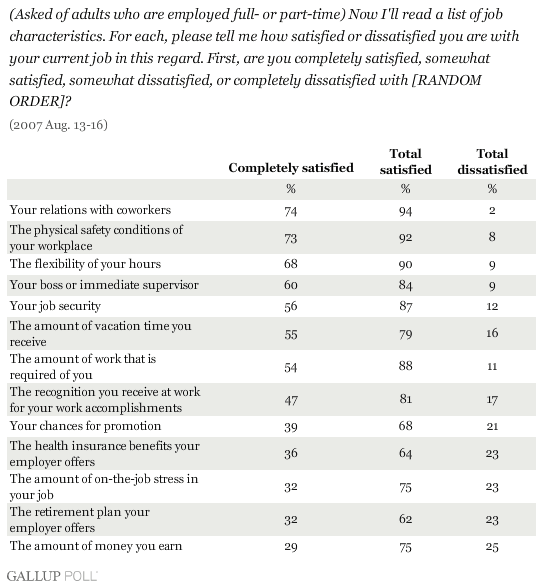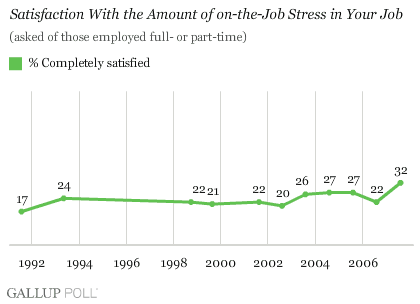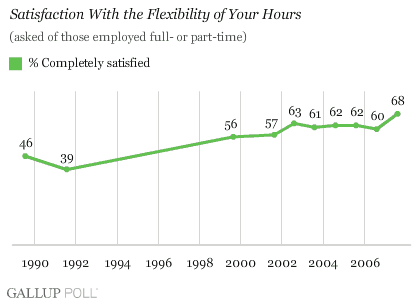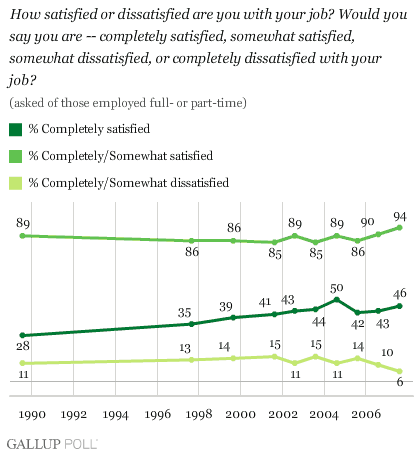PRINCETON, NJ -- A recent �鶹��ýAV Poll asked American workers to rate their satisfaction with 13 different aspects of their jobs, and the results show workers are most satisfied about their relationships with their coworkers and the physical safety conditions at their workplaces. Workers are least satisfied with the amount of on-the-job stress, the retirement benefits their employers offer, and their pay. One of the biggest changes over time has been the increased level of satisfaction with flexibility of work arrangements on the job. Satisfaction with job-related stress has also improved. Employees express higher satisfaction this year with their bosses or supervisors, the safety conditions at work, and coworker relations. In terms of how they feel about their jobs overall, just under half of workers say they are completely satisfied, with most of the rest "somewhat" satisfied; only 6% are dissatisfied.
Workers' Satisfaction With Different Job Aspects
The Aug. 13-16, 2007, poll asked those who are employed full- or part-time if they are completely satisfied, somewhat satisfied, somewhat dissatisfied, or completely dissatisfied with 13 aspects of their jobs. U.S. workers are at least somewhat satisfied with all 13, but there is wide variation by item in the percentage claiming to be "completely satisfied."
Employees are most satisfied with their relations with their coworkers and the physical safety conditions at their workplaces -- nearly three in four say they are completely satisfied with these two aspects of their jobs. Solid majorities of workers also say they are completely satisfied with the flexibility of their hours (68%) and their bosses or immediate supervisors (60%), and at least half say they are this satisfied with their job security (56%), their vacation time (55%), and the amount of work required of them (54%).
Fewer than half of workers are completely satisfied with the recognition they receive at work for their work accomplishments (47%), their chances for promotion (39%), and the health insurance benefits their employers offer (36%).
Workers express the least amount of satisfaction with the amount of on-the-job stress (32%), the retirement benefits their employers offer (32%), and the amount of money they earn (29%).

Workers' satisfaction with two job aspects has grown more positive this year, and is higher than it has been in the past:
- The amount of on-the-job stress in your job. Although on-the-job stress remains one of the lowest-rated items, the 32% of workers who say they are completely satisfied with it is the highest percentage �鶹��ýAV has measured since the question about stress was first asked in 1991. Prior to the latest survey, the percentage completely satisfied ranged between 17% and 27%, and was 22% last year.

- The flexibility of your hours. Since 1989, workers have grown more satisfied with the flexibility of their work hours, perhaps in response to companies trying to be more accommodating to their employees. Nearly 7 in 10 workers say they are completely satisfied with their work-hours flexibility, compared with only about 4 in 10 in the early 1990s.

The percentage of workers saying they are completely satisfied with coworker relations, the safety conditions at their work, their bosses or supervisors, job security, vacation time, and the required amount of work are all at or tied with their highest points to date, but these percentages are not significantly higher than at other points in recent years. Workers' satisfaction with their health insurance benefits is up slightly since last year, but has previously been even higher.
There has been essentially no change this year in workers' overall satisfaction with their chances for promotion, their retirement benefits, their recognition for work accomplishments, or their overall income.
Overall Job Satisfaction
The poll also updated American workers' overall satisfaction with their jobs. Forty-six percent of workers say they are completely satisfied with their jobs. An additional 48% say they are somewhat satisfied, and just 6% say they are dissatisfied.
�鶹��ýAV has tracked this measure since 1989, and the current 46% who are completely satisfied is on the high end of what �鶹��ýAV has recorded. Workers were most satisfied in 2004, when 50% said they were completely satisfied with their jobs. Few workers have ever said they are dissatisfied with their jobs; those who are not completely satisfied tend to say they are "somewhat" satisfied. This phenomenon may reflect the simple fact that workers who are dissatisfied with their jobs find a way to change jobs rather than remaining in an unsatisfying situation.

Survey Methods
Results are based on telephone interviews with 1,019 national adults, aged 18 and older, conducted Aug. 13-16, 2007. For results based on the total sample of national adults, one can say with 95% confidence that the maximum margin of sampling error is ±3 percentage points.
For results based on the sample of 547 adults employed full- or part-time, the maximum margin of sampling error is ±4 percentage points.
In addition to sampling error, question wording and practical difficulties in conducting surveys can introduce error or bias into the findings of public opinion polls.
